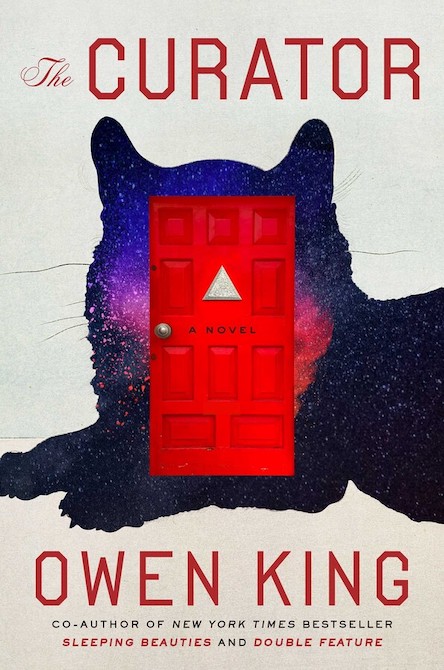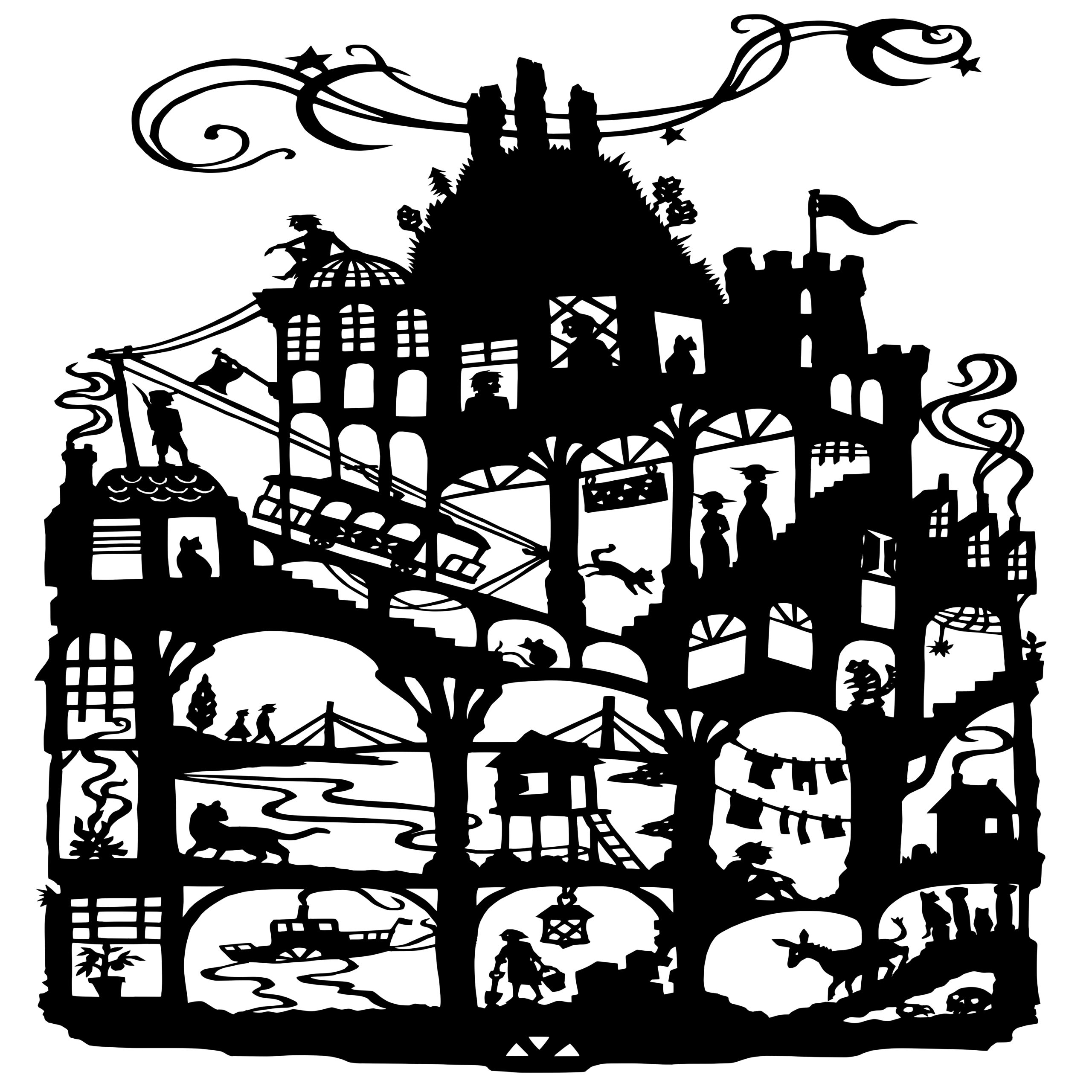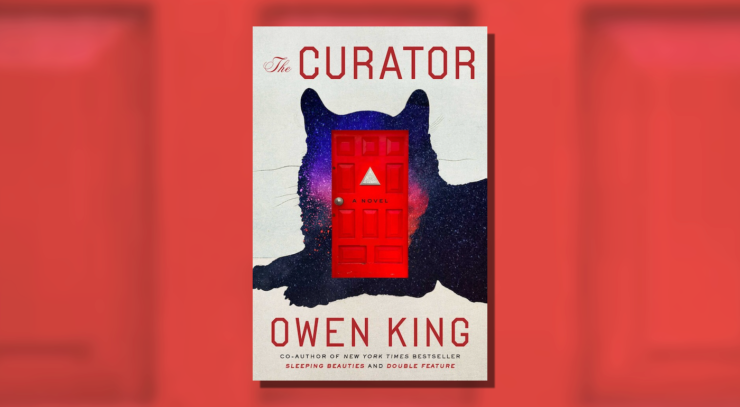Dora has a secret desire—to find where her brother went after he died…
We’re thrilled to share an excerpt from The Curator by Owen King, out from Scribner on March 7th.
It begins in an unnamed city nicknamed “the Fairest”, it is distinguished by many things from the river fair to the mountains that split the municipality in half; its theaters and many museums; the Morgue Ship; and, like all cities, but maybe especially so, by its essential unmappability.
Dora, a former domestic servant at the university has a secret desire—to find where her brother went after he died, believing that the answer lies within The Museum of Psykical Research, where he worked when Dora was a child. With the city amidst a revolutionary upheaval, where citizens like Robert Barnes, her lover and a student radical, are now in positions of authority, Dora contrives to gain the curatorship of the half-forgotten museum only to find it all but burnt to the ground, with the neighboring museums oddly untouched. Robert offers her one of these, The National Museum of the Worker. However, neither this museum, nor the street it is hidden away on, nor Dora herself, are what they at first appear to be. Set against the backdrop of a nation on the verge of collapse, Dora’s search for the truth behind the mystery she’s long concealed will unravel a monstrous conspiracy and bring her to the edge of worlds.
Maybe Especially So
The city—nicknamed “the Fairest” by poets and municipal advocates for its river, the mighty Fair—jutted from the body of the country like a hangnail from its thumb.
Buy the Book


The Curator
Folklore told that it was founded by a stonecutter who built a castle there and kept it empty in tribute to God, and was granted eternal youth as a reward; until, after a few hundred years, a family of beggars sneaked inside and their sudden appearance shocked the stonecutter such that he fell dead. More likely, the initial settlement was established by seafarers of Nordic origin.
In modern times, the city was distinguished by the line of handsome, heavy-browed monarchs who kept seat there; by its congress and its courts; by the efficiency, fortitude, reach, profitability, and diversity of its mercenary army, which was said to include speakers of more than twenty languages; by its river, the Fair, which descended from the country’s mountain region to split the metropolis in half, into east and west, and to drown its fresh waters in the ocean; by the peninsula’s high bluffs, which diminished seaward in parallel to the Fair; by the bustle and trade of its port; by its two cantilevered bridges; by the modern convenience of its network of electric trams; by its vast urban parkland, the Royal Fields, and the Royal Pond therein, where boaters rowed in vessels whose prows were carved into the likenesses of the nation’s heavy-browed monarchs, from Macon I to Zak XXI; by the competition among its luxury hotels as to which establishment had the most luxurious cat as its mascot; by its cultural landmarks, such as the theaters and the museums and the Morgue Ship; by the three towering monolithic stones that dominated the plateau above the Great Highway a few miles beyond the city limits and to which, by tradition, newlyweds from all over the world traveled with hammers and picks in order to chip tokens to signal their shared commitment; by the irony of its stinking gray waterway’s name; by its factory fires; by its neighborhood fires; by its teeming lower district, the Lees; by the fecund poor who populated the Lees and gave their new generations to nourish its plagues and armies; by its vestiges of paganism; by its secret societies; by the tartness of the brine used to pickle its oysters; by the bands of industrious delinquents that crowded its streets; by the courage and strength of its men; by the wisdom and perseverance of its women; and, like all cities, but maybe especially so, by its essential unmappability.

New People
Prior to the uprising she had labored in domestic service at the National University, but now D contrived to obtain a position at the Society for Psykical Research. Everywhere in the city new people would be needed—would they not?—to fill the places that had been occupied by members of the deposed regime and its supporters. This was true not only with regard to the government and the military, but all across day-to-day life, where every place from schools to shops to gasworks to theaters had been ruled over by the elites for as long as anyone could remember.
Although she had passed inside the Society’s walls just once, as a young girl, a picture of it remained in D’s mind, of “the Grand Hall” where she had waited one morning for a servant to retrieve her older brother, who had been a junior member. The floor had been covered in a gold and red carpet that looked thick enough to her child’s eye to bury a marble in; books filled the high shelving that spanned the walls; at a writing table a woman in a sweeping blue hat bent over an open ledger, marking lines with a compass and a ruler; on a neat little stage was arrayed an exhibit of conjurer’s tricks; from the ceiling hung a large mobile of the galaxy, its sun the size of a croquet ball and its eleven planets the size of billiard balls; and in front of the fireplace was a gentleman in tweed breeches, asleep in a leather chair with a smile on his face and his hands tucked under his armpits.
In the difficult years that followed her single visit, D had often retreated to the idea of calm and possibility that the commodious and civilized room seemed to represent. If such a perfect space could quietly exist inside a city like this one, maybe there was something else, something more—another part of life, concealed.
Her visit to the Society and its Grand Hall had taken place roughly fifteen years earlier, at a time when an insurrection against the wealthy and the powerful was unimaginable. It was not long afterward that her brother, Ambrose, died after a short bout of cholera. The two events, the visit and Ambrose’s death, were connected in her mind.
D often thought of her brother’s final words. They had been awestruck, parched but clear: “Yes, I see you. Your… face.”
Whose face? Ambrose had been nothing if not secretive, forever slipping off, and he sometimes said things D had not known whether to believe or take seriously. Once, he had told her that there were other worlds. Maybe it was true. D was almost certain that he had seen something in those final moments, not a hallucination, something real and amazing. There had been conviction in his voice.
If there was an afterlife, or other-life—anything else, anything at all—her brother was the one D wanted to find there.
In adulthood, however, this hope had occurred to her only dreamily, on the occasions that errands sent her along Legate Avenue, when she would pause to glimpse, down the byway of Little Heritage, the fine brick building that housed the Society for Psykical Research, tucked away in the shade of twin poplar trees.
Until opportunity presented itself. The revolution had all but thrown open the Society’s bright-red door and invited her inside.
***
D asked her lover, a lieutenant in the Volunteer Civil Defense named Robert Barnes, if he could help her, and he said he would do anything she’d like, but—“psykical research, Dora?” Was that the kind of club where frivolous rich women went in order to have their palms stroked, and to engage deceased eminences in conversation? Because that was what it sounded like.
“Lieutenant,” D replied, “just who is giving the orders around here?”
***
They went to the headquarters of the Provisional Government, which was located at the Magistrates’ Court near the mid-east bank of the river.
On the plaza they found an aide to Crossley. While the students and the dockmen’s union and other radicals had fomented the unrest, it had been General Crossley’s alignment with the opposition leaders that accelerated and solidified the revolution. Without the muscle of Crossley’s Auxiliary Garrison, they could never have forced the regime into retreat and out of the city.
The aide, a Sergeant Van Goor, was posted at a small table. He wore large emerald cufflinks, and as he propped his chin on his fist, one of the emeralds reflected a spot of watery green light into the eye of the statue of a rearing tiger that dominated the center of the slated plaza. D suspected that the cufflinks had only recently come into Sergeant Van Goor’s possession.
Her lieutenant explained what they wanted and pledged that she was a patriot. “That so?” Van Goor smiled at her. She lowered her eyes and nodded.
“Lovely. I’m convinced,” he said. “Go to it.”
But Robert wanted her to have something more official; he didn’t want any trouble or confusion. He dug a scrap of paper from his pocket and wrote out a declaration. It granted D authority over the Society building and its grounds “in order to preserve the public’s rightful property until such time as the freely elected government is established and an assessment undertaken for its future use.” He read it aloud to the aide.
Van Goor chuckled, said it was handsome, and carefully made his initials on the bottom of the paper.
The pair walked northeast with their elbows linked.
***
An upright piano, a tattered tablecloth, broken wine bottles, a rubber tree with its root ball exposed amid the shards of its pot, scattered books, and a thousand other things, flotsam of the deposed government and its supporters that had been dumped from wagons and carriages, littered the National Boulevard. D thought, With all the domestics being promoted, everyone will have to learn to tidy up their own messes. People were only beginning to emerge after the fighting that had driven the Crown’s Home Guard from the city.
Those they passed wore jolted expressions, and stood casting glances here and there, as if to locate themselves amid the scattered wreckage.
“Everything’s all right now,” the lieutenant assured several of the disoriented strangers without being asked. They blinked and smiled tentatively and tipped their hats in response, and seemed to come back to themselves.
“Are you sure, sir?” one woman blurted. She peered at Robert through the scratched lenses of a pair of tiny spectacles. Her skirt was black and dusty; a nurse, D guessed, or a teacher.
“Yes,” he said.
“They’ve surrendered?”
“They’re gone,” the lieutenant said, “and they’re not coming back.”
D saw the woman in the dusty skirt frown, but what Robert had said seemed to satisfy the others nearby, several of whom clapped and hooted. “Come on, then,” announced one bystander, inspired, and a group gathered around the carcass of a toppled carriage to muscle it off the tram tracks.
D spied her lieutenant grinning to himself. In profile, he looked his rank: curly black hair hooking the tops of his ears and fringing the nape of his neck, excellent straight nose just ahead of his strong chin. It sneaked up on her every now and again, how much she liked him. When he said that everything was all right and would stay that way, you could believe that it was true.
Other young men wearing the green armbands that designated membership in the Volunteer Civil Defense were stationed on the streets to maintain order. Robert, like many of the Volunteers formerly a student at the university, flashed ironically casual salutes to his fellows and they flashed them back in return.
A little boy, feet stuffed into some rich woman’s canary-yellow evening slippers that he must have scavenged, ran up and saluted the lieutenant. Robert halted, froze the boy with a dour squint, and abruptly snapped a salute back at him. The boy dashed off squealing.
One man called to the lieutenant from beneath a shaded second-floor window: “How can a hungry man be of service, Officer?”
Her lieutenant hollered up to him to go to the encampment on the grounds of the Magistrates’ Court. He told him where to find the aide who had signed D’s declaration. “Tell him Lieutenant Barnes sent you.” He would be fed and something would be found for him to do; there was no shortage of work to be done.
“Thank you for your help! I won’t shame you! I’ll work hard at whatever I’m set to,” the man called after them. “Once I’m at it, there’s no one can outdo me. May a cat smile on you, sir! And your lady!”
There were several more encounters like this one. Each time, Robert stopped and spoke to the person, offering advice on how to find food or work or whatever sort of help they needed. D was impressed at how he didn’t shy away from these people, many of whom were visibly in want, clothed in rags and unkempt. By the way he held his shoulders after each of these consultations, she thought her lieutenant was impressed with himself as well.
They neared the edge of the Government District, where Legate Avenue’s embassies bumped against midtown, and turned onto the avenue. Here, signs of the conflict diminished. Along the row of embassies, the flags of other nations still hung, their colors resplendent in the clear morning sunlight, though the ambassadors and diplomats had all departed. In its unprecedented vacancy the avenue seemed to lay itself out just for them—all the way to the iron post bearing the street sign that read Little Heritage Street.
Excerpted from The Curator by Owen King. Excerpted with the permission of Scribner, a Division of Simon & Schuster, Inc. Copyright © 2023 by Owen King.










